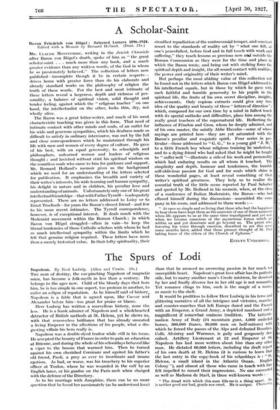A Scholar-Saint Baron Friedrich von Htigel : Selected Letters 1896-1924.
Edited with a Memoir by Bernard Holland. (Dent. 21s.) MR. CLAUDE MONTEHORE, writing in the Jacish Chronicie after Baron von Iliigel's death, spoke of him as "the great scholar-saint . . . much more than any book, and a much greater evidence than any written words, of the God in whom he so passionately believed." The collection of letters now published—incomplete though it be in certain respects-- drives home with greater force than do his elaborate and already standard works on the philosophy of religion the truth of these words. For the best and most intimate of these letters reveal a largeness, depth and richness of per- sonality, a balance of spiritual vision, solid thought and tender feeling, against which the "religious teacher" on one hand, the intellectualist on the other, looks thin, dry, not
wholly alive. • The Baron was a great letter-writer, and much of his most characteristic teaching was given in this form. That need of intimate contact with other minds and souls, of an outlet for his wide and generous sympathies, which his deafness made so difficult to satisfy in ordinary intercourse, was met by the full and close correspondences which he maintained through his life with men and women of every degree of culture. He gave of his best, with an equal generosity, to schoolgirls and philosophers, unlearned women and leaders of religious thought ; and lavished without stint his spiritual wisdom on the countless souls who came to him for guidance and support. Mr. Bernard Holland's memoir gives us the background which we need for an understanding of the letters selected for publication. It emphasizes the breadth and variety of their writer's interests, his wide learning and human sympathy, his delight in nature and in children, his peculiar love and understanding of animals. Unfortunately only one of his great intellectual friendships—that with Father Tyrrell—is adequately represented. There are no letters addressed to Loisy or to Ernst Troeltsch—for years the Baron's closest friend—and few to his more recent intimates. The Tyrrell correspondence, however, is of exceptional interest. It deals much with the Modernist movement within the Roman Church ; in which Baron von Hugel struggled—often in vain—to keep the liberal tendencies of those Catholic scholars with whom he had so much intellectual sympathy within the limits which he felt that genuine religion required. These letters have more than a merely historical value. In their lofty spirituality, their
steadfast repudiation of the controversial temper, and constant resort to the standards of reality set by "what one felt, at one's peacefullest, before God and in full touch with work and suffering," they teach lessons as precious now and outside the Roman Communion as they were for the time and place in which the Baron wrote, and bring out with striking force the spiritual depth and insight, the all-round contact with realities, the power. and originality of their writer's mind.
But perhaps the most abiding value of this collection mill be found not in the letters which Baron von Hiigel addressed to his intellectual equals, but in those by which lie gave with such faithful and humble generosity to his pupils in the spiritual life, the fruits of his own secret discipline, insights, achievements. Only copious extracts could give any true idea of the quality and beauty of these" letters of direction"; which, composed for our own time by a mind in fullest touch with its special outlooks and difficulties, place him among the really great teachers of the supernatural life. Reflecting the influence of Fenelon and Grou, whom he deeply admired, and of his own master, the saintly Abbe Huvelin—some of whose sayings are printed here—they are yet saturated with the Baron's peculiar and exquisite spirit. Four series in par- ticular—those addressed to "G. G.," to a young girl "J. M.," to a little French boy whose religious training he undertook, and to a dying friend who had asked that he might be taught to"suffer well "—illustrate a side of his work and personality which had enduring results on all whom it touched. The simplicity and depth, humour and tenderness, the humble self-oblivious passion for God and for souls which shine in these wonderful pages, at least reveal something of their writer's spiritual greatness. They help us to realize the essential truth of the little scene reported by Paul Sahatier and quoted by Mr. Holland in his memoir, when, at the close
of a conference of Italian Modernists, the Baron—who had effaced himself during the discussions—assembled the com- pany in his room, and addressed to them words :-
" At once so simple and so living that those who had the happiness to hear them have kept them as the souvenir of one of those moments when life appears to us at the same time transfigured and yet real, when we become conscious of the mysterious forces which are within us and yet dominate and go beyond us. The priest who, lowering his voice through emotion, described to me this scene some months later, added that those present thought of St. Paul taking leave of the elders of the Church of Ephesus."
EVELYN UNDERH










































 Previous page
Previous page